Davyd Petrovych vs. Goliath: The gradual revival of the devastated village of Moshchun, a year on from the Russian invasion
In the beginning was a word, and the word was "boom". On 9 February 2022, baby Davyd was born in the village of Moshchun. Just two weeks later, he and his family were hiding from shells and bombs in a cellar until he could be evacuated.
"See what a beautiful little boy he is!'' says Valentyna Onyshchenko, Davyd's grandmother, showing me her smartphone. "Such a bundle of joy. He's one. He's so funny.
Already walking. Davyd Petrovych, our child of war. His first word was 'boom', and the second was 'mama'."
The toddler returned to his native village last spring, when the smell of scorched earth still lingered there. A year on from the Russian invasion, when it was devastated by artillery and aircraft, Moshchun's main asset is its people. And the silence, which is repeatedly broken by explosions at the nearby training ground in the village of Novi Petrivtsi.
"Boom," Davyd repeats, taking his first steps where the Kremlin's Goliath left footprints. The battles for Moshchun, 15 kilometres from the outskirts of Kyiv, are among the most heroic events in the struggle for the Ukrainian capital. Servicemen from the 72nd Black Cossacks Separate Mechanised Brigade bore the brunt of the attack by Russian airborne assault troops and marines.
They were assisted by soldiers from the Special Operations Forces, territorial defence and the National Guard. The exact number of Moshchun's fallen defenders is still unknown. On 11 September 2022, relatives of 68 servicemen killed in this strategic part of the front came to the village from all over Ukraine to attend memorial services.
The Kyiv Oblast Military Administration estimates that between the end of February and 21 March, the day Moshchun was liberated, almost 70% of the buildings in the village were destroyed. In May 2022, the website damaged.in.ua shared the results of a large study. An analysis of 562 drone images showed that 1,964 of the village's 2,714 residential buildings and outbuildings had been reduced to rubble.
The Kyiv School of Economics has estimated the cost of the damage at UAH 1.1 billion (approx. US£30 million). Petro Makushenko, who was the Moshchun village head before the establishment of the military administration, told Ukrainska Pravda that 12 civilians were killed in the fighting.
Makushenko says that up to 600 residents who returned after the village was liberated - two-thirds of its population prior to 24 February 2022 [when the full-scale Russian invasion started - ed.] - are now trying to establish their lives here. What might be called home comforts - though that is really stretching it - now mostly depend on volunteers, church organisations, donations, foreign embassies and the victims themselves. People are living in portacabins or partially destroyed buildings.
Some have equipped outbuildings, sheds and garages for the winter. Moshchun has several small shops, a postal service, and a link to the Pushcha-Vodytsia and Nyvky suburbs of Kyiv via bus route 719. Ukrainska Pravda journalists visited Moshchun a year on from the Russian invasion to find out how people are coping in the aftermath of the destruction and whether they believe the village can be brought back to life.
Valentyna
"Are you the owner?" "Yes, I'm the owner," Valentyna Onyshchenko says as she opens the bullet-riddled gate. "I was the owner once. Now I'm the owner in name only."
After 24 February 2022, the remains of what had been the ancestral home where Valentyna had grown up and lived for over half a century fitted into five KamAZ trucks, which took the rubble away to a landfill site. "We have a large property, more than 18 acres." She leads us through the wasteland. "There used to be a garden, a vegetable garden, a greenhouse, a trampoline, swings. This, over here, was going to be my son's house.
He spent ten years building it himself - he'd almost finished it. But that's gone, there is no house. He has to start all over again now."
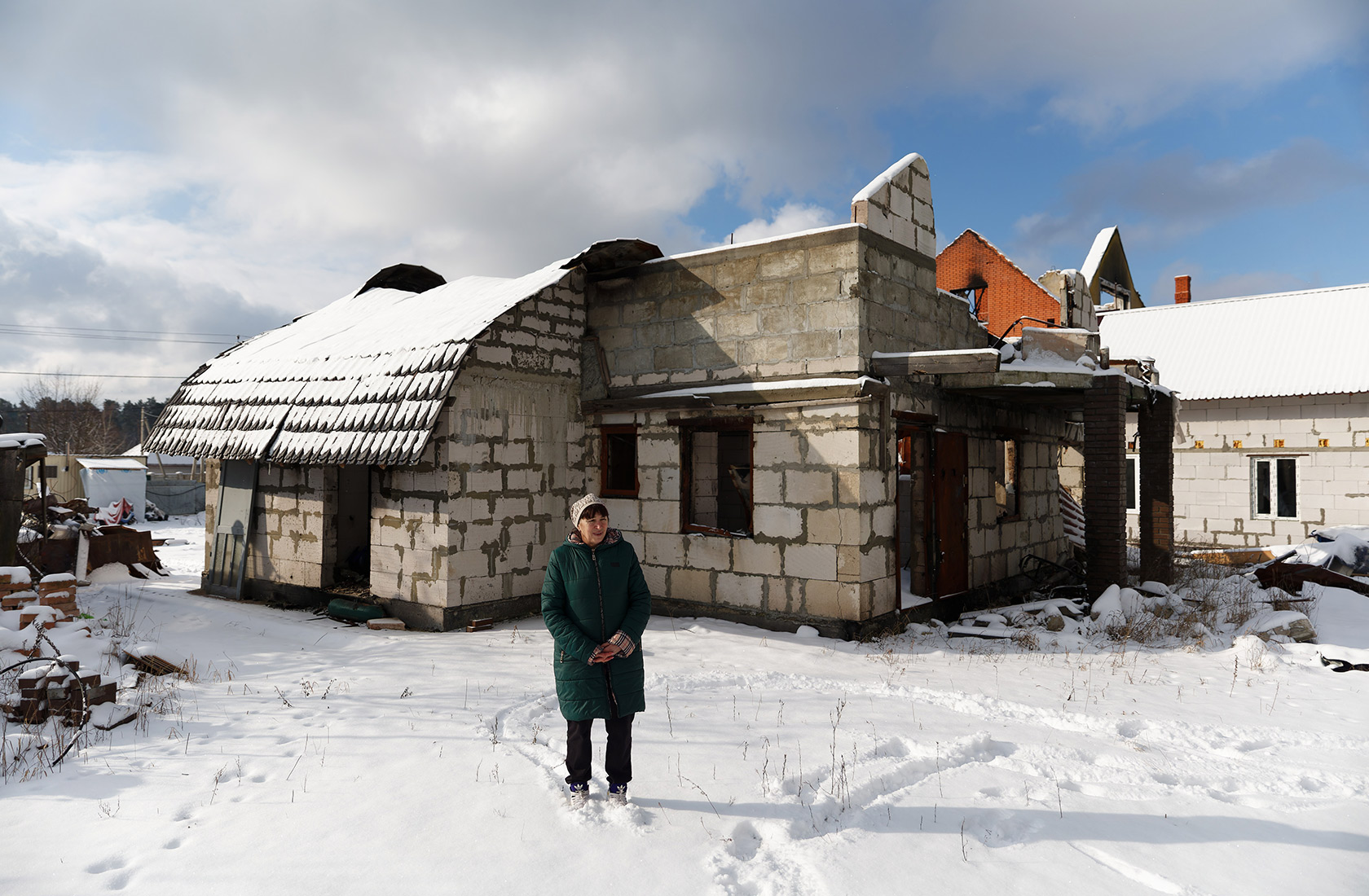 Once upon a time, an episode of the TV series Matchmakers, produced by Volodymyr Zelenskyy, was filmed in Moshchun.
Once upon a time, an episode of the TV series Matchmakers, produced by Volodymyr Zelenskyy, was filmed in Moshchun.
But the narrative about friendship between peoples and common cultural space did not work out
ALL PHOTOS: DMYTRO LARIN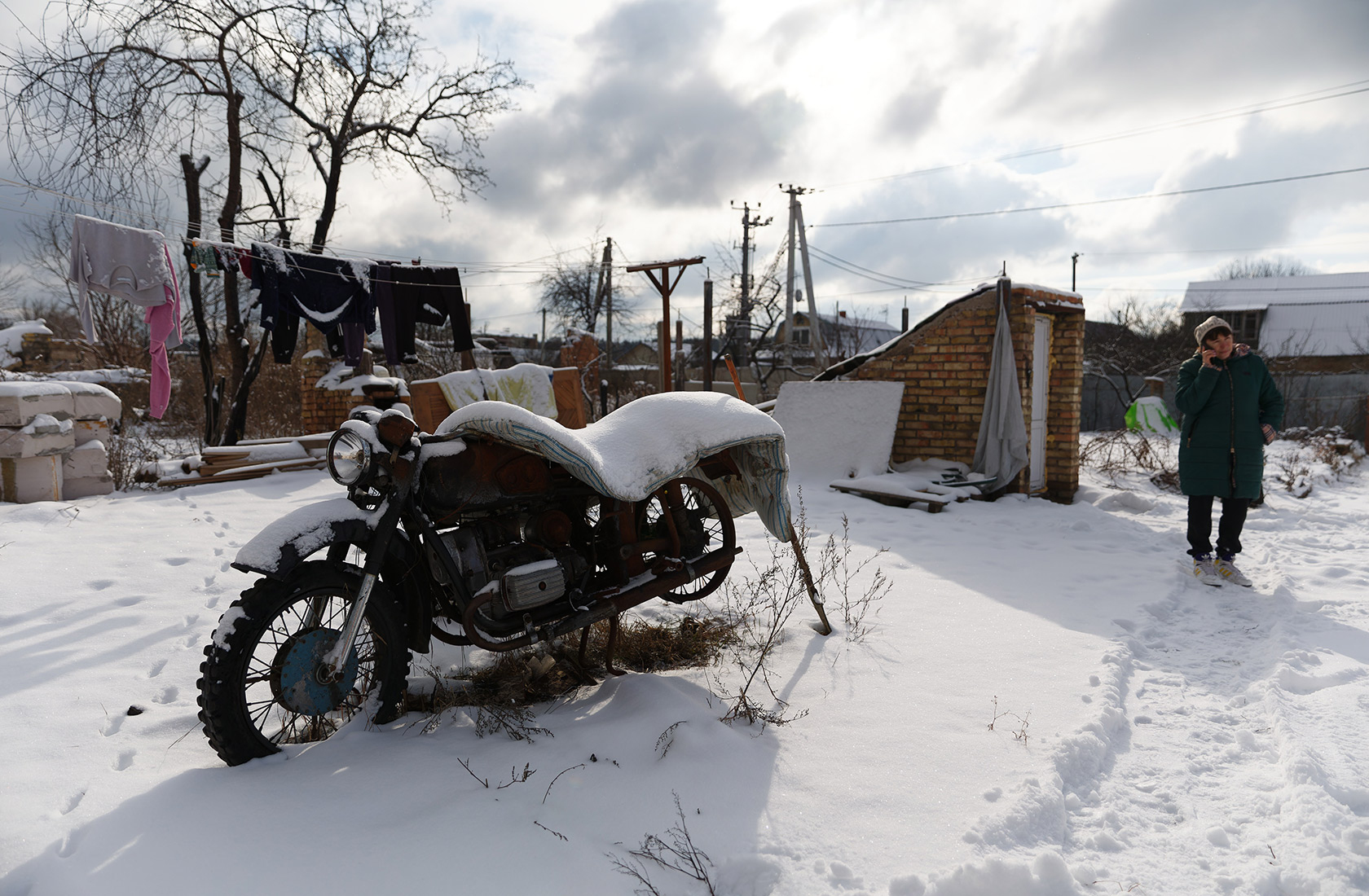 Despite the destruction and loss of property, Valentyna Onyshchenko is happy to be home
Despite the destruction and loss of property, Valentyna Onyshchenko is happy to be home
After the Russians invaded, Valentyna hid in a cellar with her family and neighbours around the clock. They went outside to make tea and cook food. "I remember getting on my scooter, off to visit Grandma Nina, when it all just started to go bang," Valentyna smiles. "My son shouted, 'Where d'you think you're going?!'
I work for social services. Grandma Nina is one of my clients. I'd promised to bring her some cheese and butter, and then the war started.
But since I'd promised, I had to deliver the food." When things got really hot all around her, Valentyna couldn't take it any more. She managed to flee on 5 March.
Two days later, a shell fell near the cellar where the family had been hiding. They returned in April to find only ashes. By autumn, portacabins started to appear in Moshchun.
Valentyna got a home that measured six by three metres.
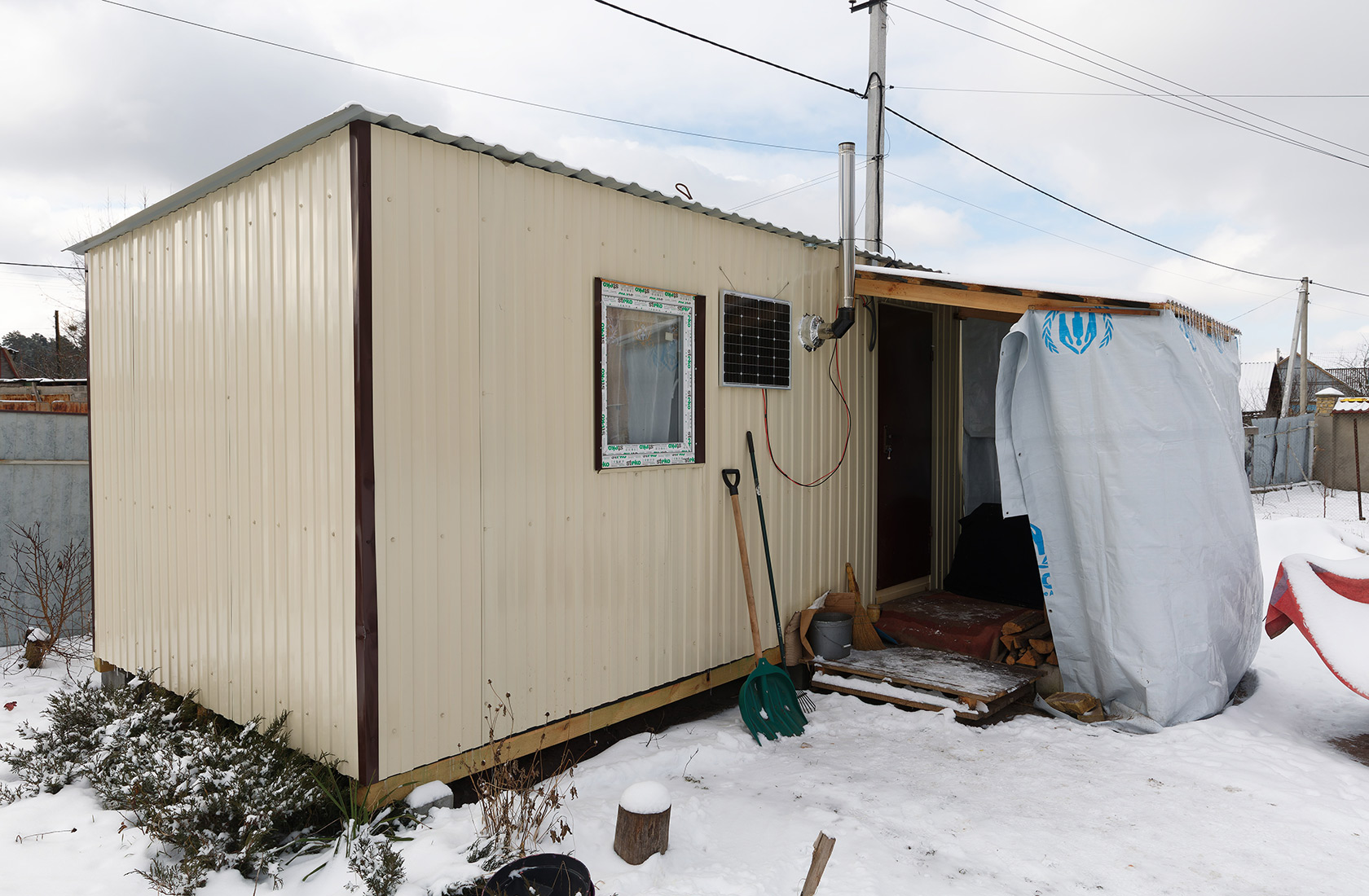
Hundreds of people live in portacabins like these
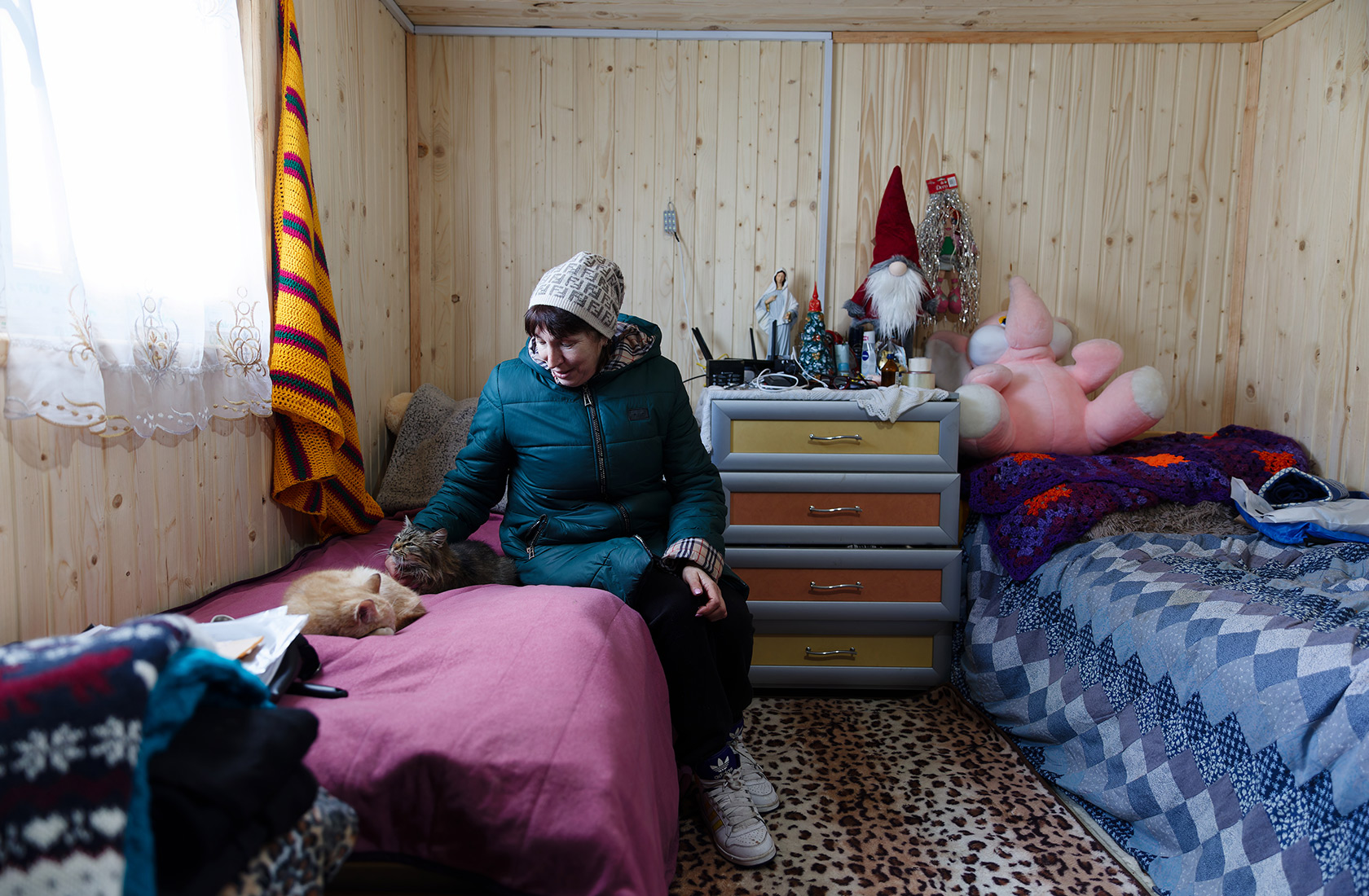 Valentyna shares a portacabin with her 35-year-old son and her pets
Valentyna shares a portacabin with her 35-year-old son and her pets
A gas cylinder heater, a wood-burning stove, a fridge, and electricity with no discounts. Cats, a bedside table, two beds and a pot of borshch. These days, Valentyna gets by with very little.
"They built a toilet outside," she explains. "There's water, from a stand-alone pump. We wash haphazardly, in Spartan conditions. Well, what can you do?"
With the arrival of the first cold days, when the portacabin did not yet have a stove and was not yet lived in, Valentyna's mood was falling as fast as the temperature. "I would go outside, light a fire, warm myself up and go to my daughter's house," Valentyna recalls. "When I got there, I'd think 'Lord, our boys are freezing in the trenches, and I'm going to pieces here?!' I would get a grip on myself and go back. Later, a wood-burning stove was installed.
It really is a life-saver. The wood-stove is a sacred thing."
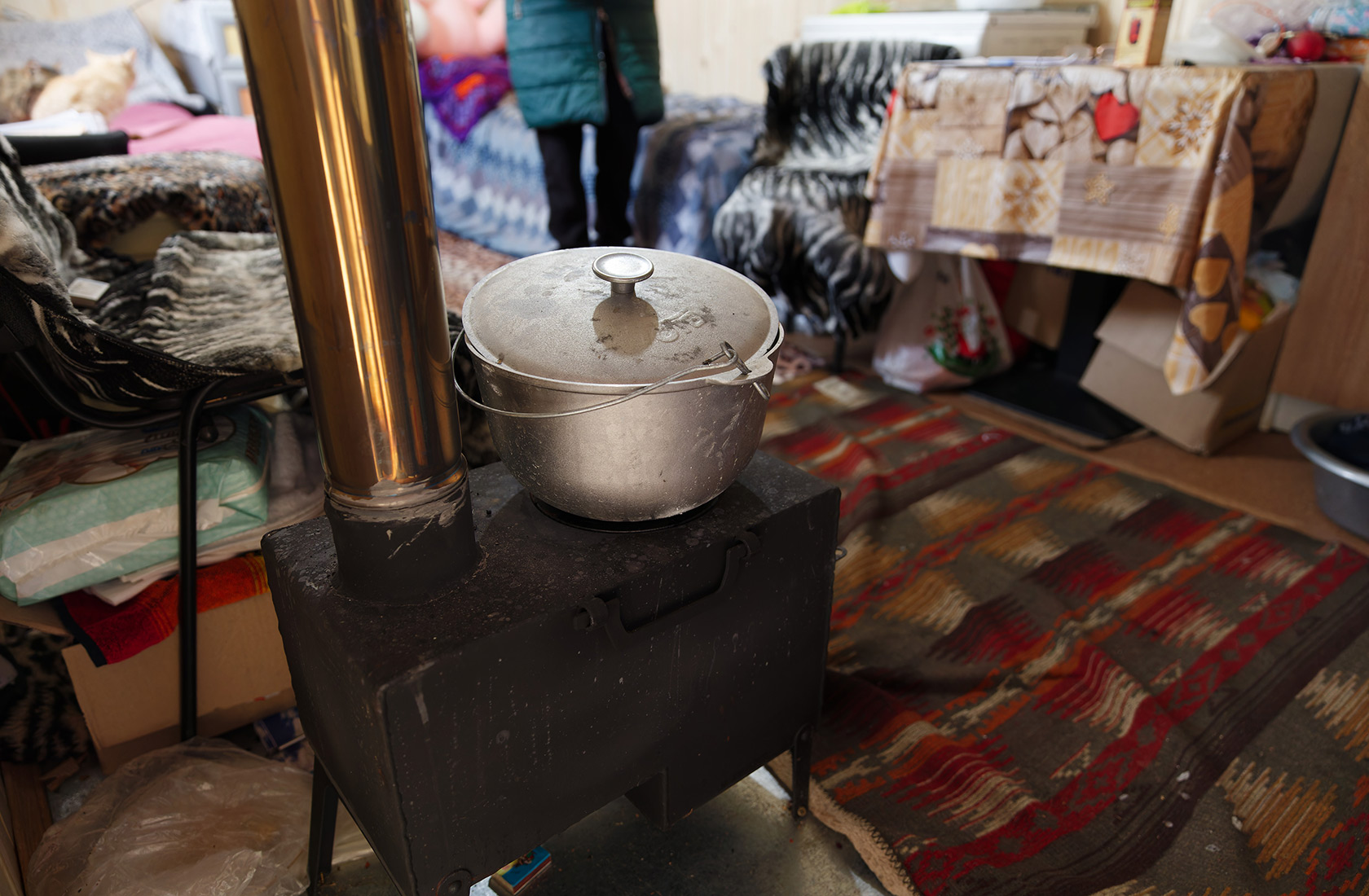 The hardest winter in Ukraine's modern history is almost over
The hardest winter in Ukraine's modern history is almost over
For months, Valentyna has looked out from the portacabin's only window at her son's destroyed house. In front of it, on the site where her house once stood, metal piles stick out of the ground.
Last year, the Newkraine Foundation pledged to build a modern modular home on Valentyna's empty land, using money donated by the world heavyweight boxing champion Oleksandr Usyk. Until this materialises, Valentyna is waiting for victory and for spring. "I wish we could wake up and be told, 'That's it, peace has come!'" dreams Valentyna. "We hope to rebuild everything.
Thank God other people are all right. That's something at least. If it weren't for Moshchun taking the hit, other villages would have suffered.
It's all right, spring is coming soon. Everything will be different. The flowers will be blooming.
I'll fix the greenhouse, and my cucumbers and tomatoes will ripen. You must come over and I'll share them with you!"
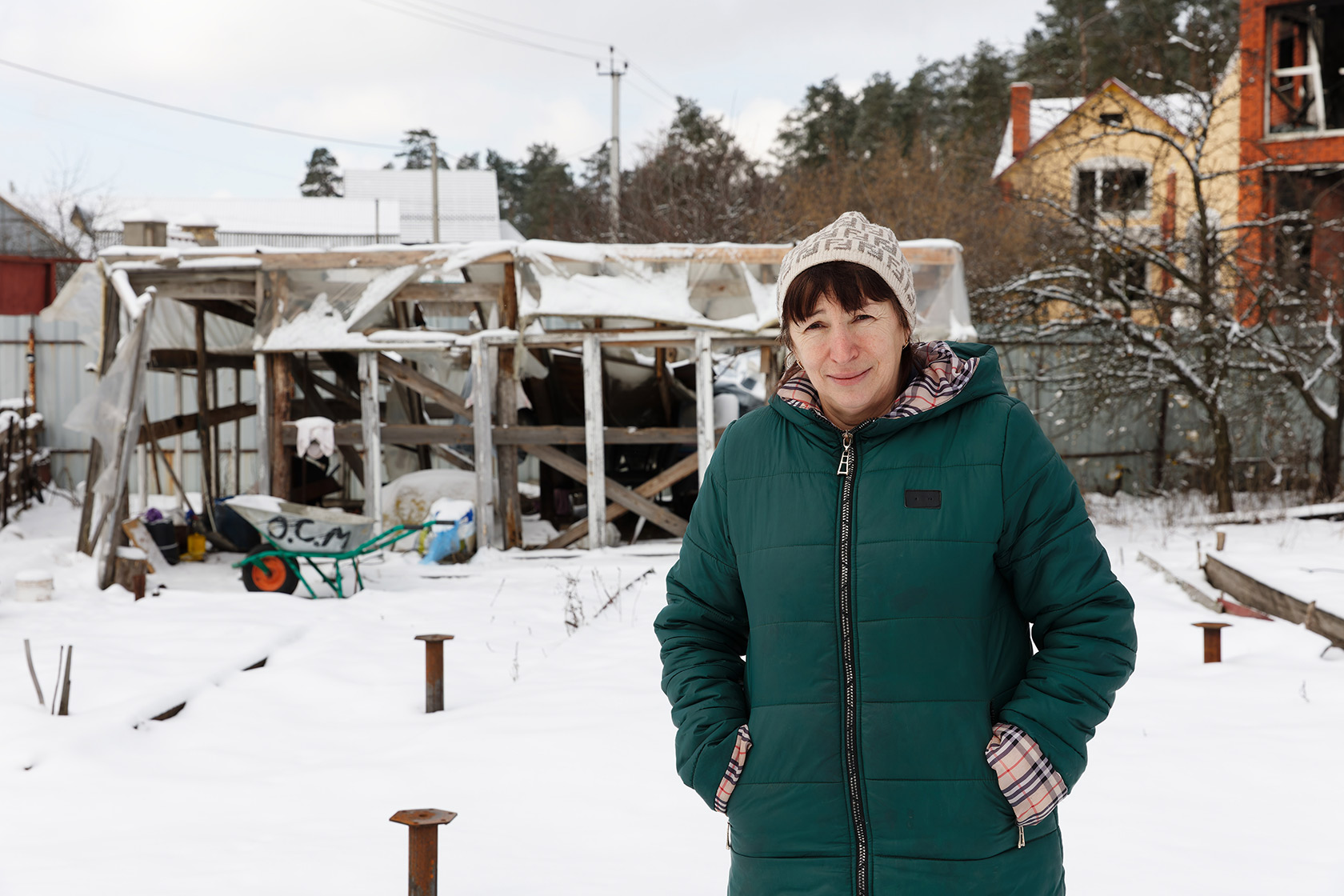 Valentyna Onyshchenko and her damaged greenhouse
Valentyna Onyshchenko and her damaged greenhouse
Markhonos
The outlines of Moshchun's future can be seen in two buildings that escaped serious damage: the church of St John the Baptist, and Serhii Markhonos's building supplies store. "Over there, a BMD [an air-deployable infantry fighting vehicle - ed.] drove into a cherry plum tree that I planted," says Serhii, 62. "And the pit you can see over there - probably our men fired at the BMD, but a little short of range.
Well, it's okay, she didn't get far. Two of those were burned out on the road. People have dismantled them for scrap metal - a BMD has an aluminium body."
Serhii Pavlovych Markhonos, a skipper by trade, served in the Soviet anti-aircraft forces. He used to work on a boat on the Dnipro River. He dealt in building supplies until he opened his own retail outlet.
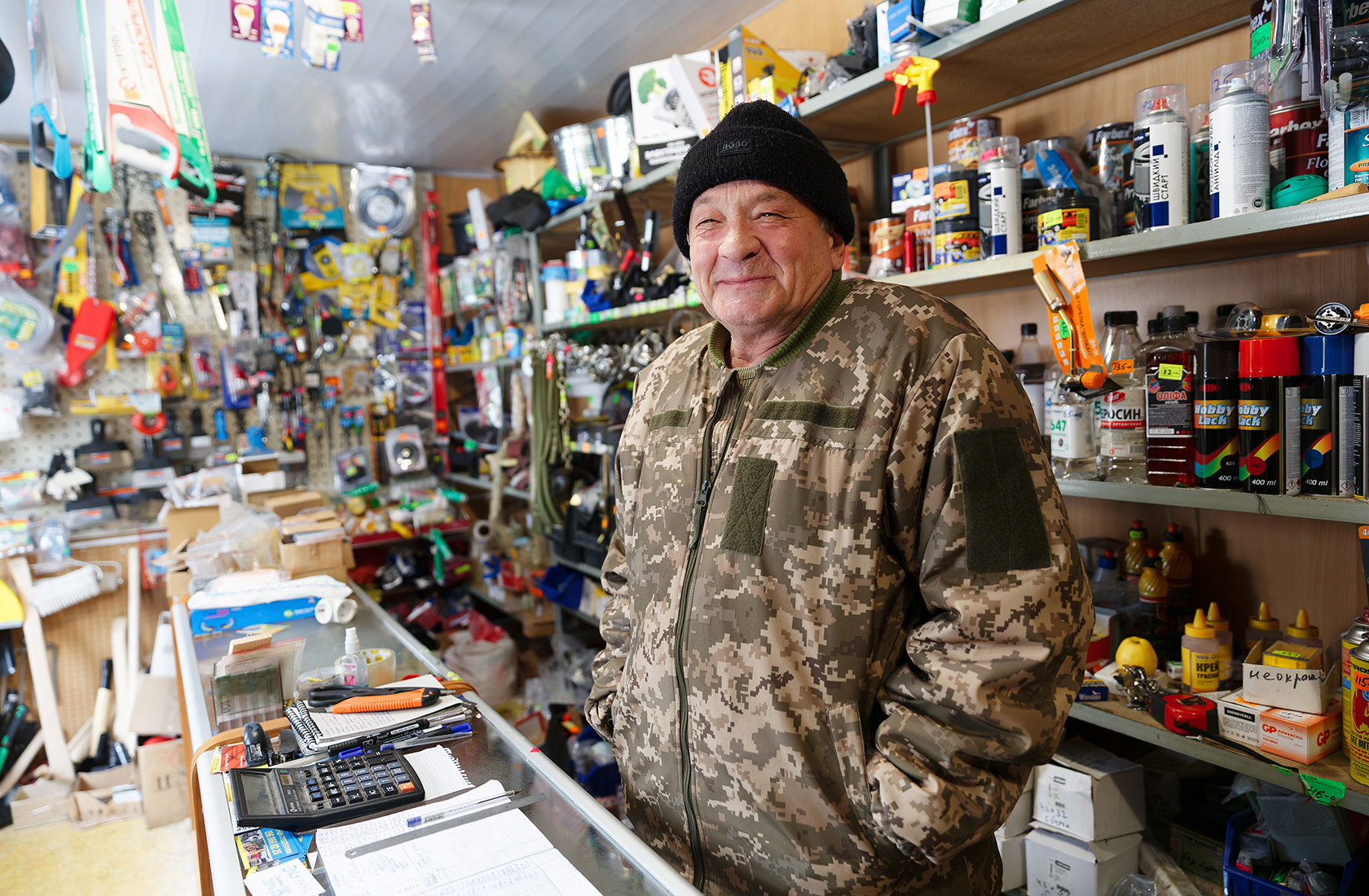 Serhii Markhonos: "I've had my business for 15 years.
Serhii Markhonos: "I've had my business for 15 years.
It hasn't grown much, but I earn enough to buy rye bread. Sometimes even enough for white bread, but not for caviar"
In the early days of the full-scale Russian invasion, Serhii supplied the defenders of the capital, Kyiv, with nails, tools and screws. Axes and shovels were loaded into Markhonos's GAZelle [a light commercial vehicle made by Russian car manufacturer GAZ], which he delivered to fit out dugouts and trenches.
Village residents sent food, water, mattresses and blankets to the frontline positions. "Once, the military put Javelins into my vehicle," Serhii smiles with satisfaction. When the situation worsened, it became necessary to hide in village cellars and basements, seeking out the strongest ones.
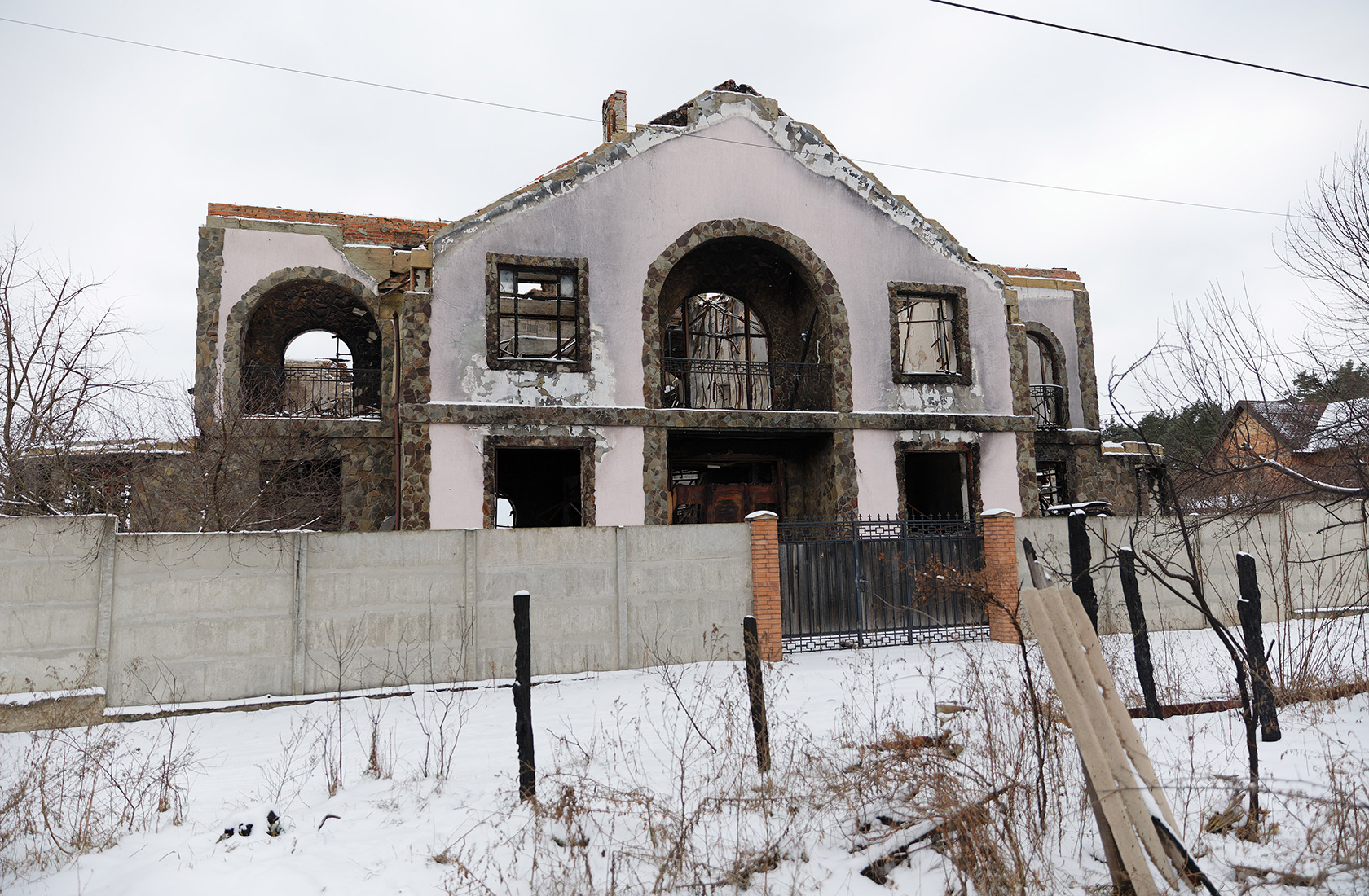 A typical picture not only for Moshchun, but for all the settlements that the Russian "liberators" were able to reach
A typical picture not only for Moshchun, but for all the settlements that the Russian "liberators" were able to reach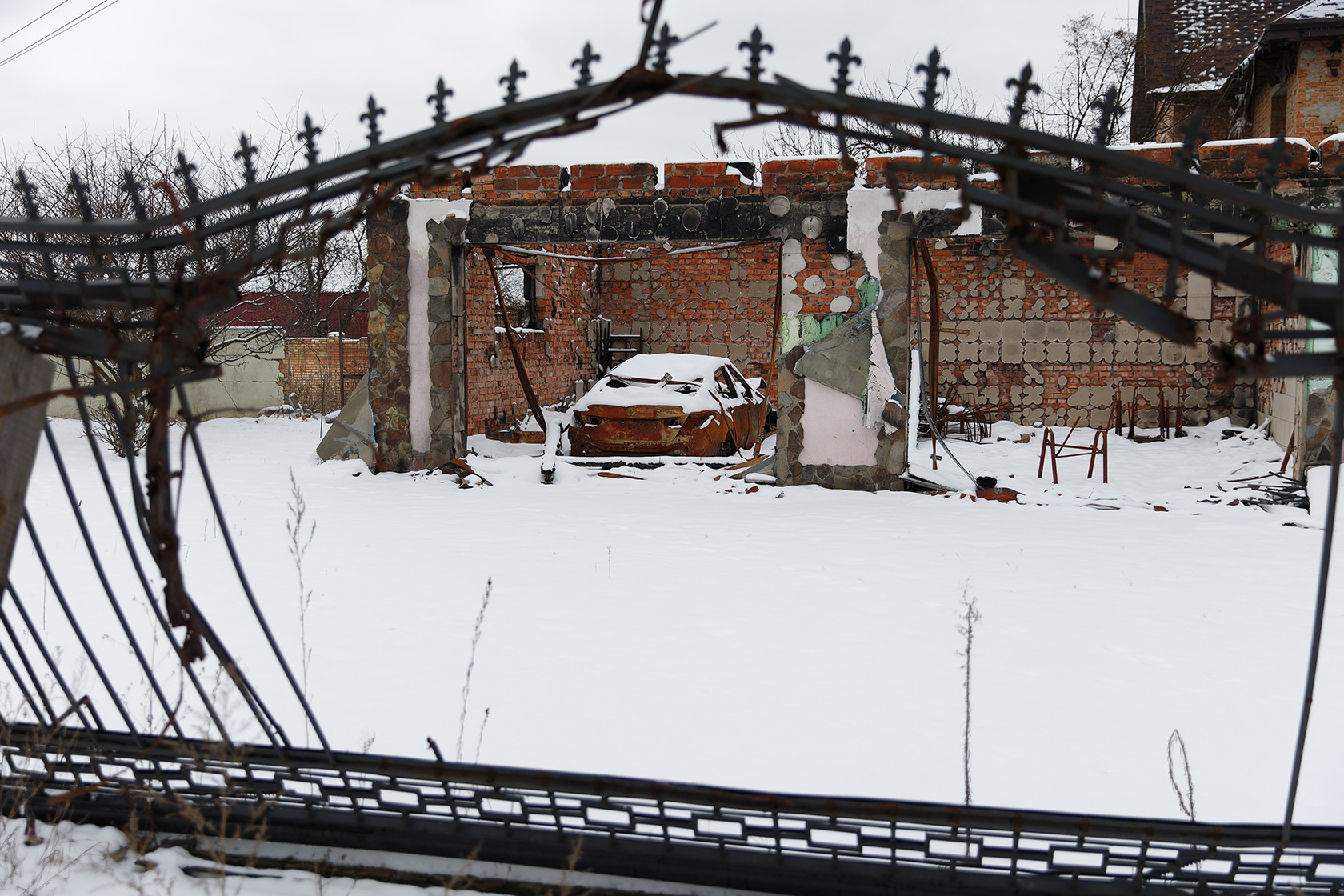 Someone's burnt-out garage and the frame of a Toyota
Someone's burnt-out garage and the frame of a Toyota
"We left on 3 March, when it had become unbearable," recalls Valia, Serhii's wife. "Our grandson is five and a half; he stopped talking altogether.
We've been taking him to doctors these past nine months, and to village healers, until it settled down. Now he stutters, but at least he's started to talk." You could say that the Markhonoses were lucky - the projectile only hit the foundation of their house.
It damaged the corner, windows and roof. In May, after returning to the liberated village, Serhii didn't wait around for help to come: he replaced the windows at his own expense. The hole in the roof was covered with a tarpaulin, and he placed pots and bowls around the room.
The roof is still leaking. The owners can't repair it - it's too expensive. Sponsors have promised to help.
"I'm an optimist, it's the only way!" Serhii says. "Do you know what an optimist is? It's an informed pessimist. So, people here are afraid that the Russians are going to come crawling back out of Belarus.
My wife is afraid. But how many are there now? Twelve thousand?
Maybe even more. But it won't be like the 24th [February 2022 - ed.].
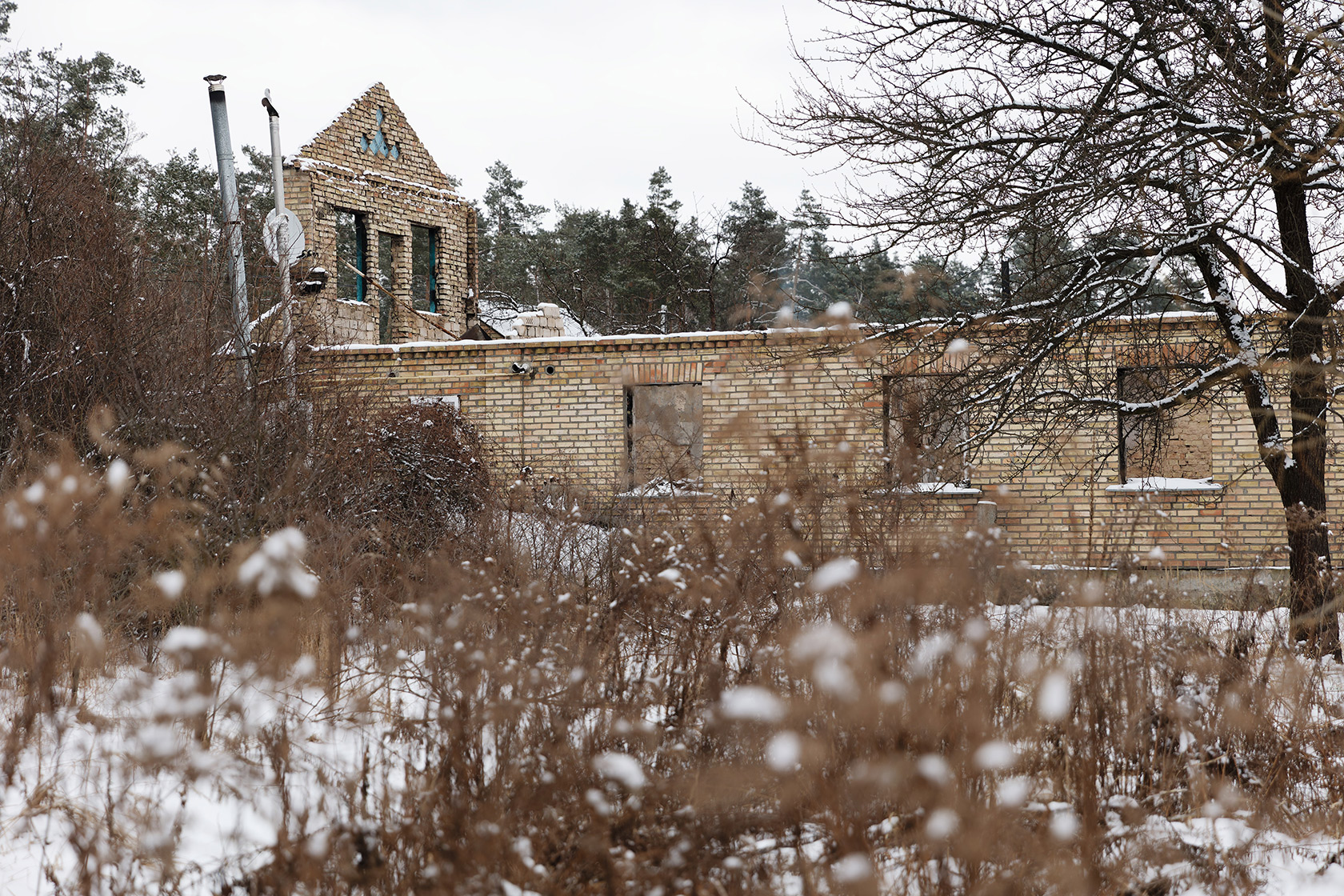 There are no signs of "major reconstruction" or rebuilding in Moshchun as yet
There are no signs of "major reconstruction" or rebuilding in Moshchun as yet
The reasons for Serhii's good humour and frequent smiles can be found in his roots. After conducting his own research, he came to the conclusion that his surname, Markhonos, comes from a Cossack nicknamed Mokryi Nis (Wet Nose), who once left his mark in the forests near Kyiv.
"The border with Poland used to be here, along the Irpin River. They say that some Cossacks were sent to the Mezhyhirya Monastery for a rest - near where Viktor Yanukovych used to live [on his luxury estate]. The entire forest as far as our village used to belong to the monastery.
And there was one snot-nosed Cossack who somehow made his way here. His nose was as snotty as mine is," Serhii jokes, snorting on purpose.
The Village Head
The heart of Moshchun was saved from the shelling in a boiler room. Petro Oleksandrovych Makushenko, the village head, hid the bright red heart-shaped village sign, which people used to take photographs next to in peacetime.
"I didn't leave until 12 March. I remember it was still frosty then. I went to the community centre and let the water out [from the radiators to prevent them from freezing - ed.].
I stowed away the computers and the heart [the village sign]. That's how it remained unharmed," he says.
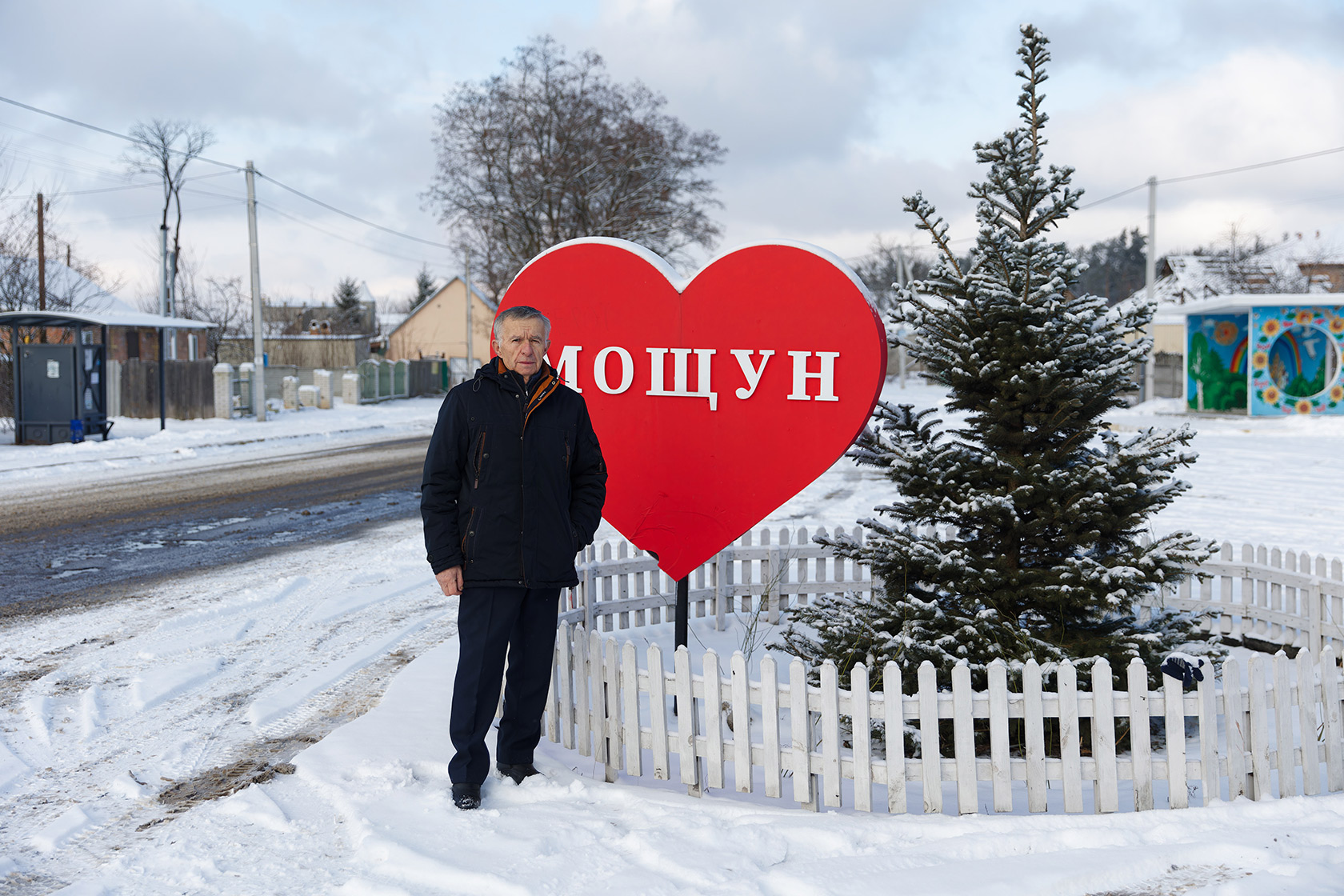 Like all active locals, Petro Makushenko became a volunteer after the start of the full-scale war
Like all active locals, Petro Makushenko became a volunteer after the start of the full-scale war
Petro Makushenko's maternal grandfather, Maksym Hryhorovych Zaika, born in 1887, served in the Imperial Navy. The 1917 Revolution found him aboard the Cruiser Diana, which was exactly the same as the infamous Cruiser Aurora [the warship said to have fired the first shot of the Bolshevik Revolution - ed.].
When Petro was young, his grandfather used to say that the story of the Aurora was not quite as epic and heroic as Soviet history lessons made out. Petro, who had worked in forestry for many years, was elected village head of Moshchun in 2021. But in the spring of 2022, after the Russians were thrown out of Kyiv Oblast, the military administration seized power.
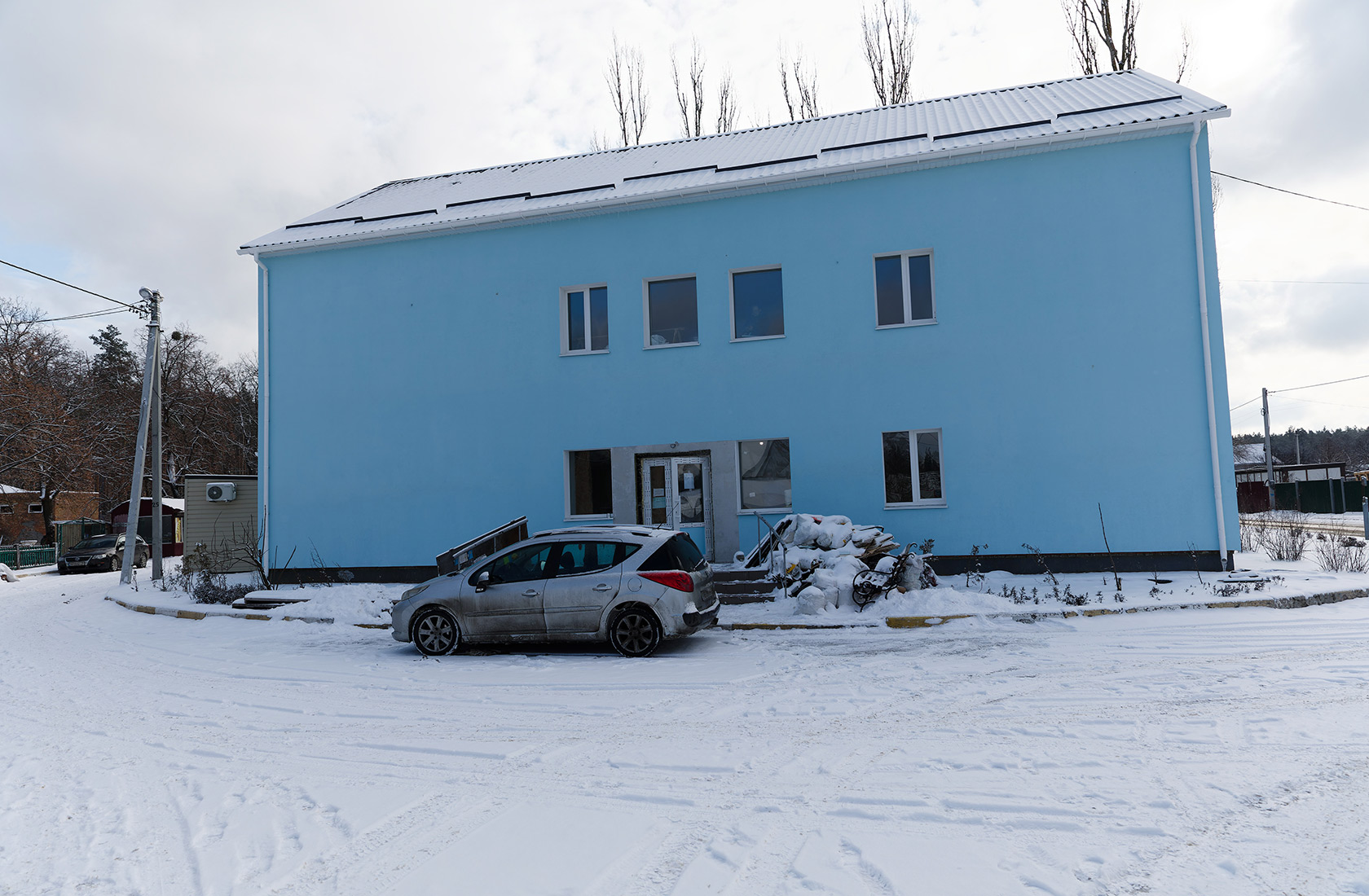 The rebuilt community centre.
The rebuilt community centre.
At the moment, internal repairs are ongoing
Petro was one of the first to be allowed back into Moshchun in early April. "Everything had to be cleared of mines," he recalls. "Yards and houses were being checked. There were four sappers and me, as the village representative.
No booby traps were found in Moschun itself. But they were further on, in the dachas. Petro defines his current status ironically as a "free listener" - someone who attends university lectures without being enrolled in the class or gaining credits.
He ends up doing a lot of listening to his fellow villagers, although the shelling damaged his own house too, and his GAZelle, his Lada Niva, a garage, and his outbuilding also burned down. "But never mind them," Petro says.
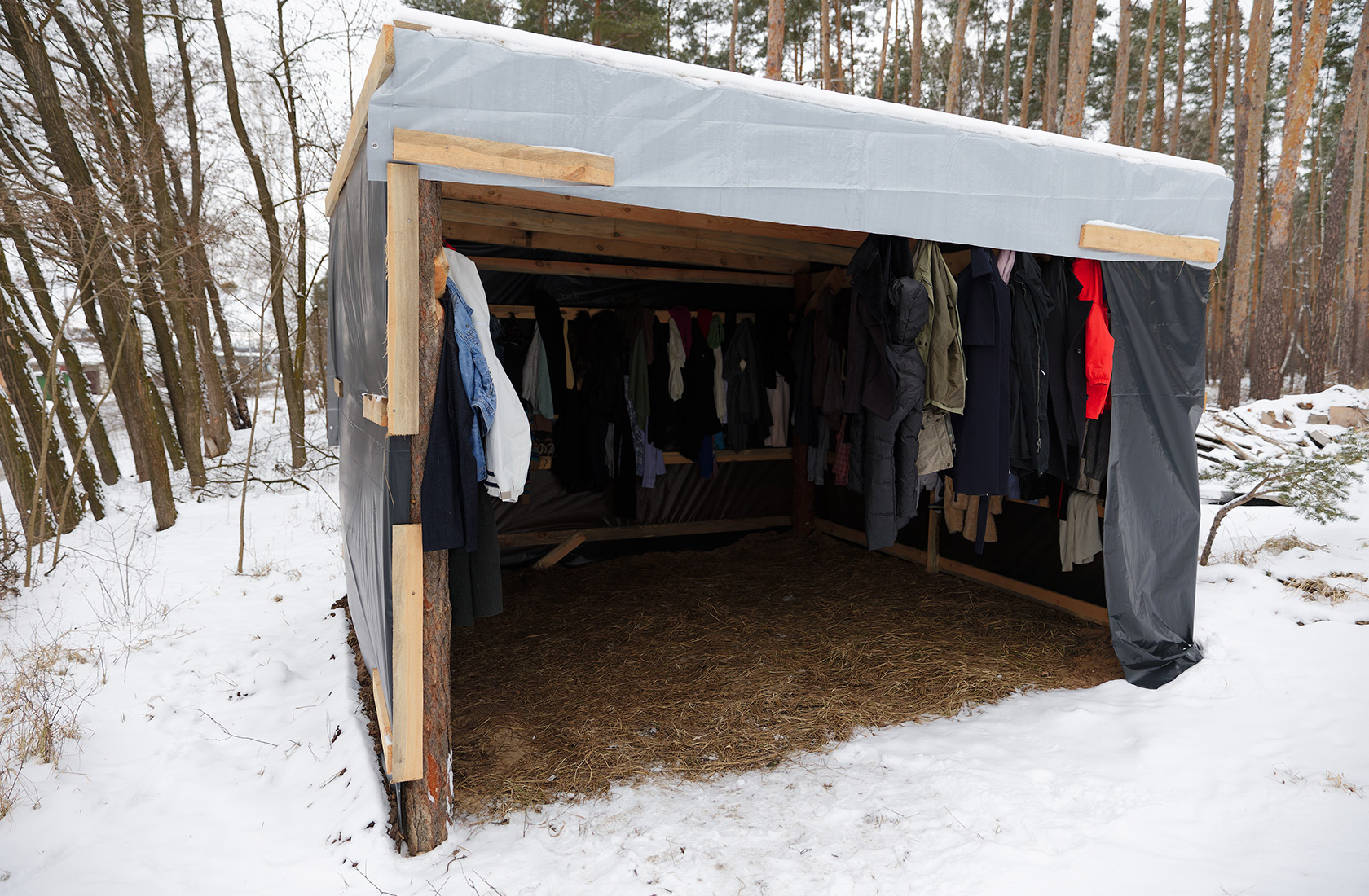 A pick-up point with free clothes on the side of a country road
A pick-up point with free clothes on the side of a country road
The charities Mii Dim (My House), Rotary and the Red Cross undertook to help Moshchun survive the winter. The Swiss embassy donated several million hryvnias for plastic windows.
"And one of the first to come to our rescue was Pastor Bill from Texas," Petro adds. "When they started letting people in here, volunteers turned up immediately. The immediate needs of food and clothing have been sorted out. We're getting through the winter okay.
In portacabins. But looking to the future, it's time to start capital construction. I would like state funds to be allocated for this."
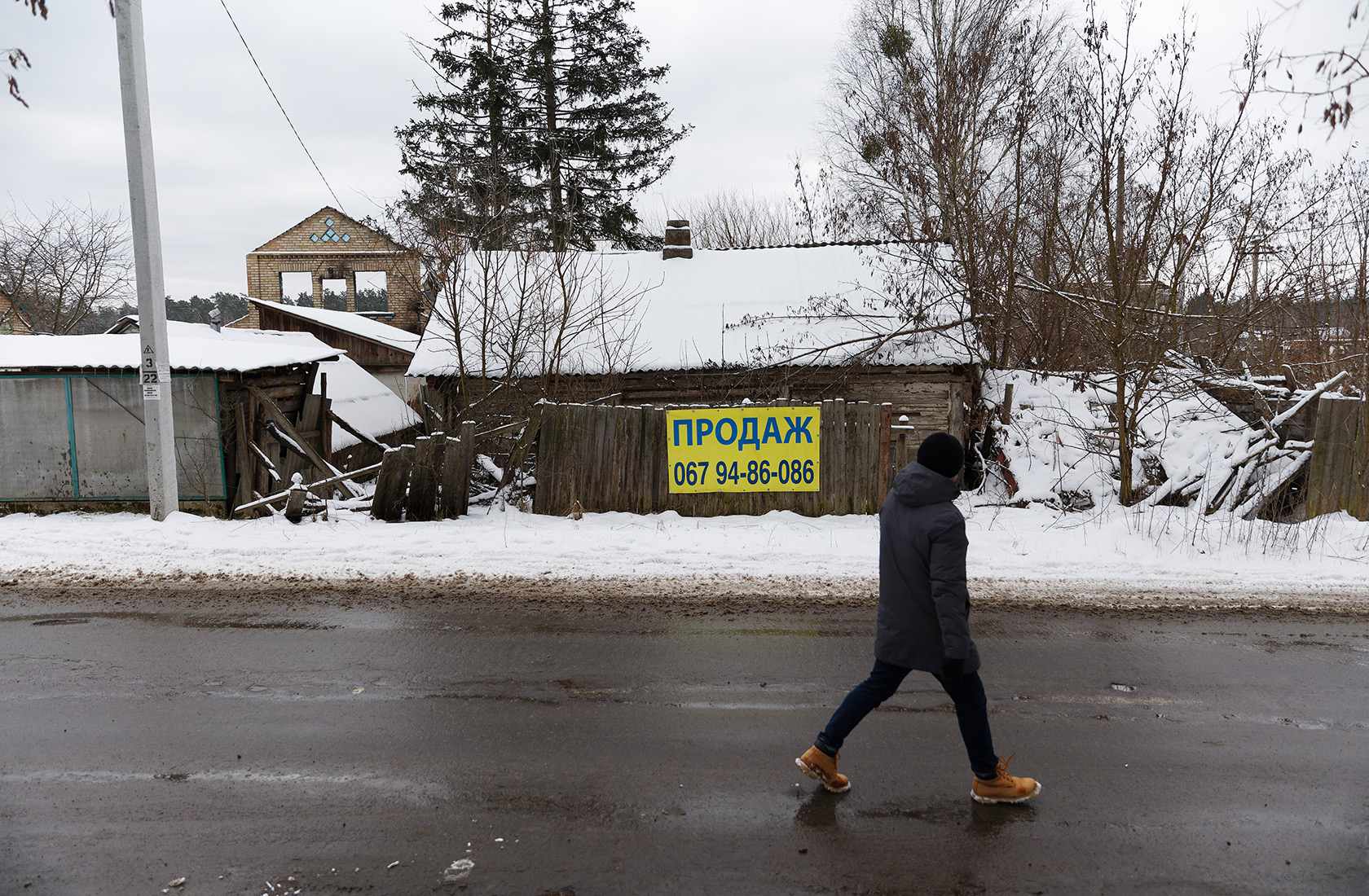 A "For sale" sign.
A "For sale" sign.
In the past, Kyiv residents who value silence used to buy land and build homes in Moshchun
Grandma Zina
Zynoviia Filimonivna Kostenko, known as Grandma Zina, may become the heroine of one of Moshchun's post-war fables, which will be passed down to future generations along with the traumas. "When our units were evacuating the village, they came to Grandma Zina's house, knocked and said, 'Time to go!' And she replied, 'Hang on, young men, let me at least have a wash and get ready. Come tomorrow'," they say in the village.
Grandma Zina is a tough nut. She was born in 1942, worked as a handywoman all her life and survived the Russian attack at the age of 79. Grandma Zina was persistently offered chances to evacuate, but she refused several times.
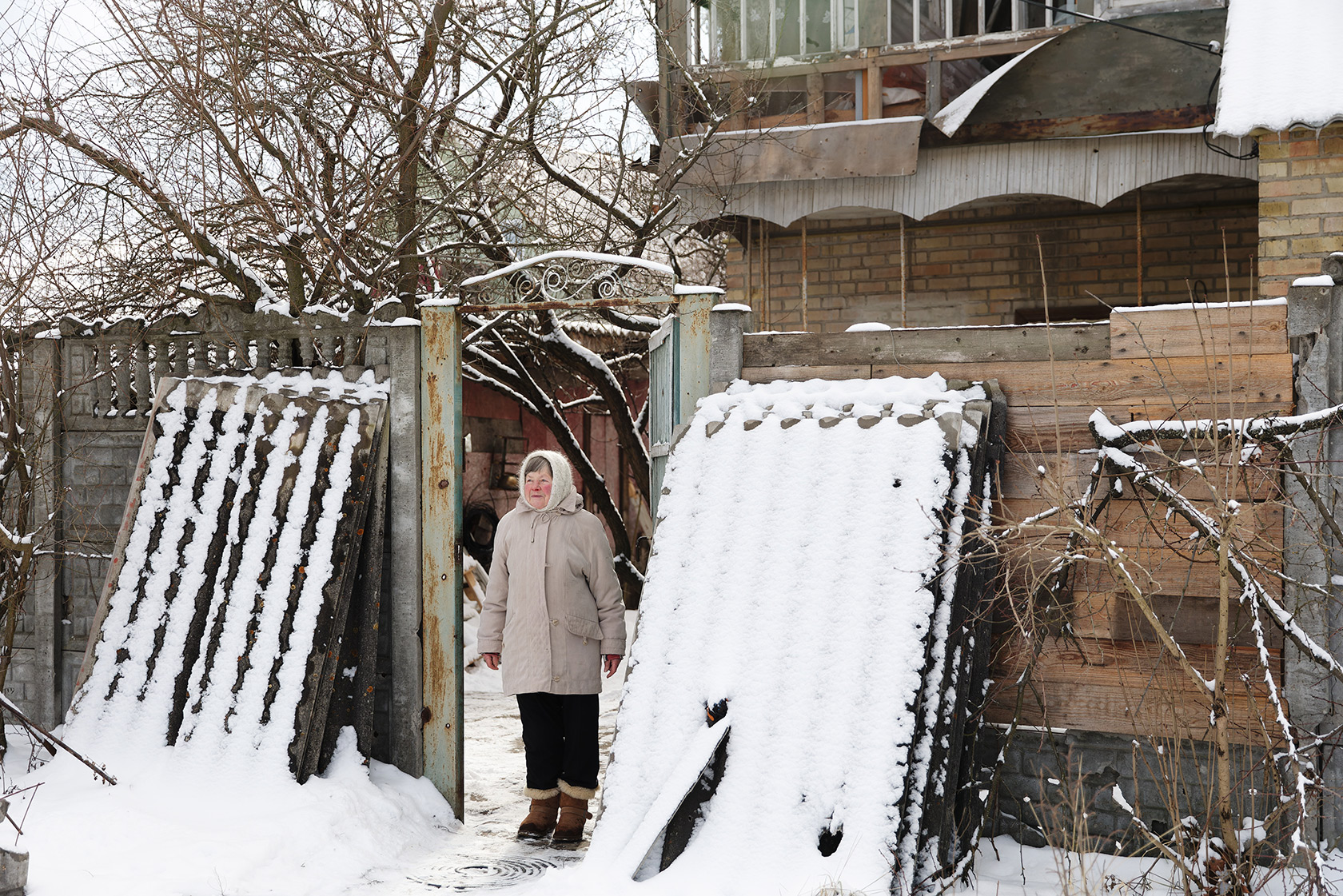 Zynoviia Kostenko survived the Second World War against the Germans, and now the Russians
Zynoviia Kostenko survived the Second World War against the Germans, and now the Russians
"I thought of it this way: God's will be done," she recalls. "I was born during the war, in 1942, and I thought I'd probably die during the war in 2022.
I thought that's it, I'm done for, when they started shooting! But it [the danger] seems to have passed, I'm still alive. I turned 80 on 21 November."
While the neighbouring houses exploded and burned, Grandma Zina was hiding behind the wall in an internal room. Then there was a strike very close by. "We were told to hide in the cellar, but the doors would fly off in the cellar all the same," she says, showing us. "And there was no longer anywhere to hide.
Over here there was shattered glass, doors, windows. A mess everywhere. The floor collapsed."
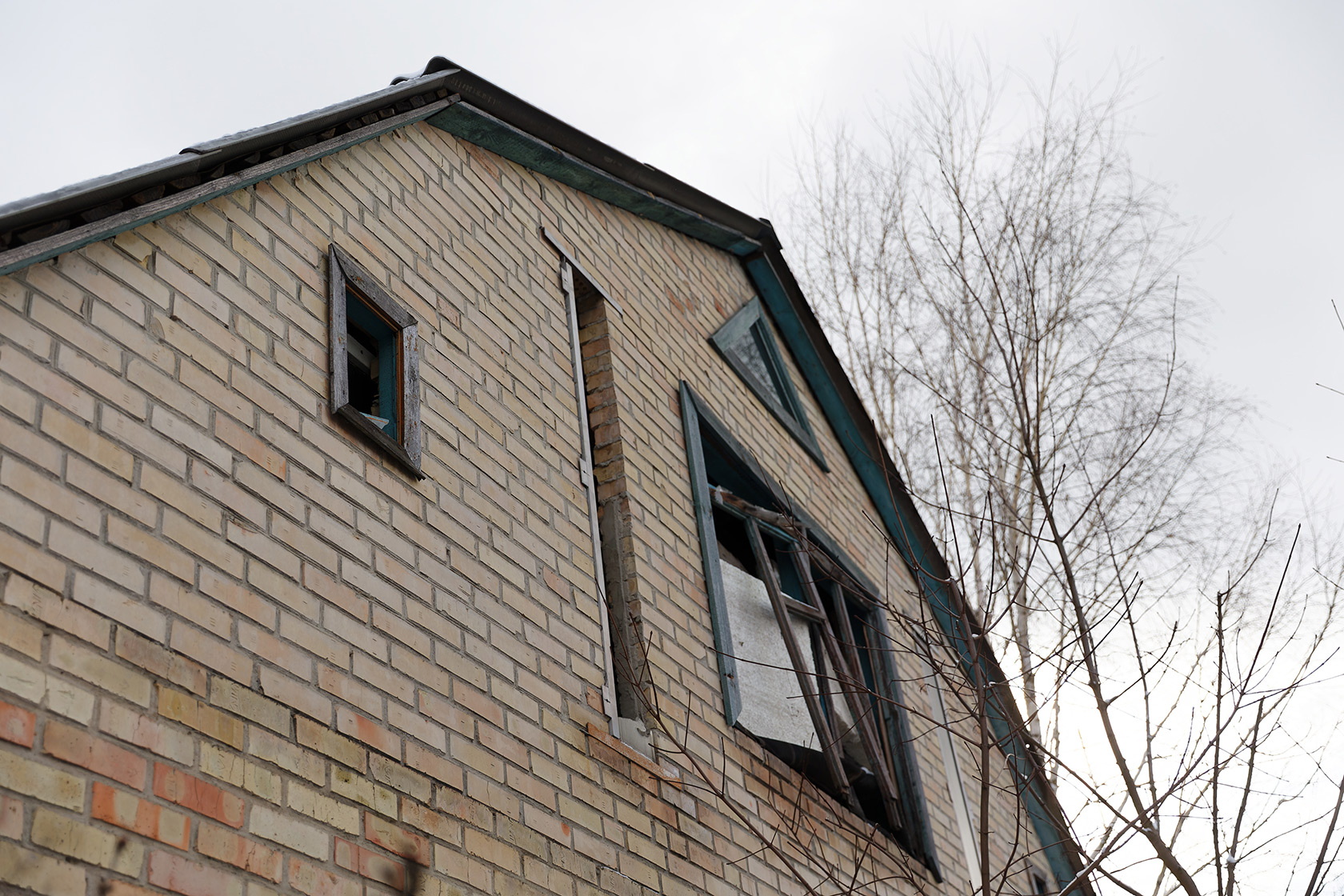 Grandma Zina's house still has a lot of damage
Grandma Zina's house still has a lot of damage
It became a little calmer when a stray dog came out onto the veranda.
"It was just like in the movies," Grandma Zina laughs. "I go into the room once, and he's sitting right here on the armchair. I say, 'Hello, what are you doing?' And he just stares and stares at me... I started feeding him.
Things somehow got easier with him around. He kept coming here. As soon as the shooting starts, he jumps into the window and barks until they stop."
Grandma Zina is spending her eightieth winter in her own home - battered by the war, but hers. She keeps the stove going with firewood purchased for UAH 6,000 (approx. US£164) and logs brought and chopped by volunteers.
"My parents' house used to be in the garden, but it burned down a long time ago. And we have this one that's big enough - my son built it. You see, the door was fitted after the war [the hostilities in the village in March 2022 - ed.], thank God.
And the windows too. The Red Cross helped - they gave me the money. I was able to hire people.
The house was reroofed, otherwise I got leaks as soon as it rained."
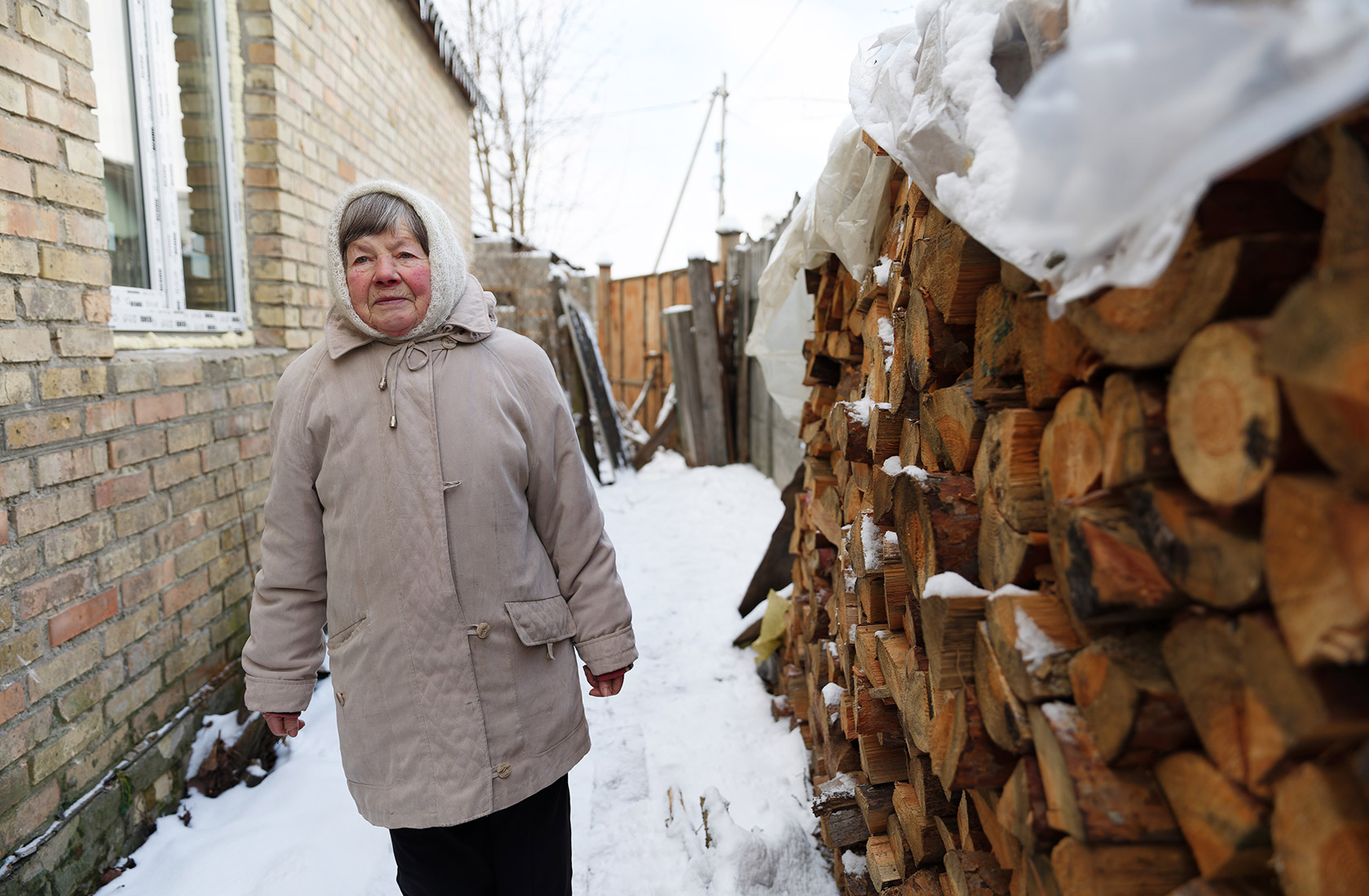 A wood burner and firewood are the most reliable way to make it through the winter at all times
A wood burner and firewood are the most reliable way to make it through the winter at all times
"Everything's going to be all right for Moshchun, isn't it? What do you think?" the youngsters ask Grandma Zina. "My hope is in God and all the saints.
And all the good, kind people. Everyone is helping. Moshchun will be rebuilt."
But
Moshchun's recent history has been defined by two main "buts".
But for the Russians, the village would not have been reduced to rubble. But for its defenders, life would not have returned to Moshchun. A year on from the invasion, the local area is quiet.
Among the pine trees, mutilated by explosions, goats are grazing. Where the dugouts and trenches used to be, where people fought and died, a memorial has been created on the initiative of Larysa Lolashvili and the families of other fallen defenders. Last spring, Larysa's son, 42-year-old Badri Lolashvili, a company commander from the 72nd Brigade, had many options he could have used to avoid death.
But for his love for Ukraine, but for the contract he made with Ukraine's Armed Forces in 2014, but for 24 February and the need to defend Kyiv in 2022. Badri, aka Pinochet, left himself no loopholes.
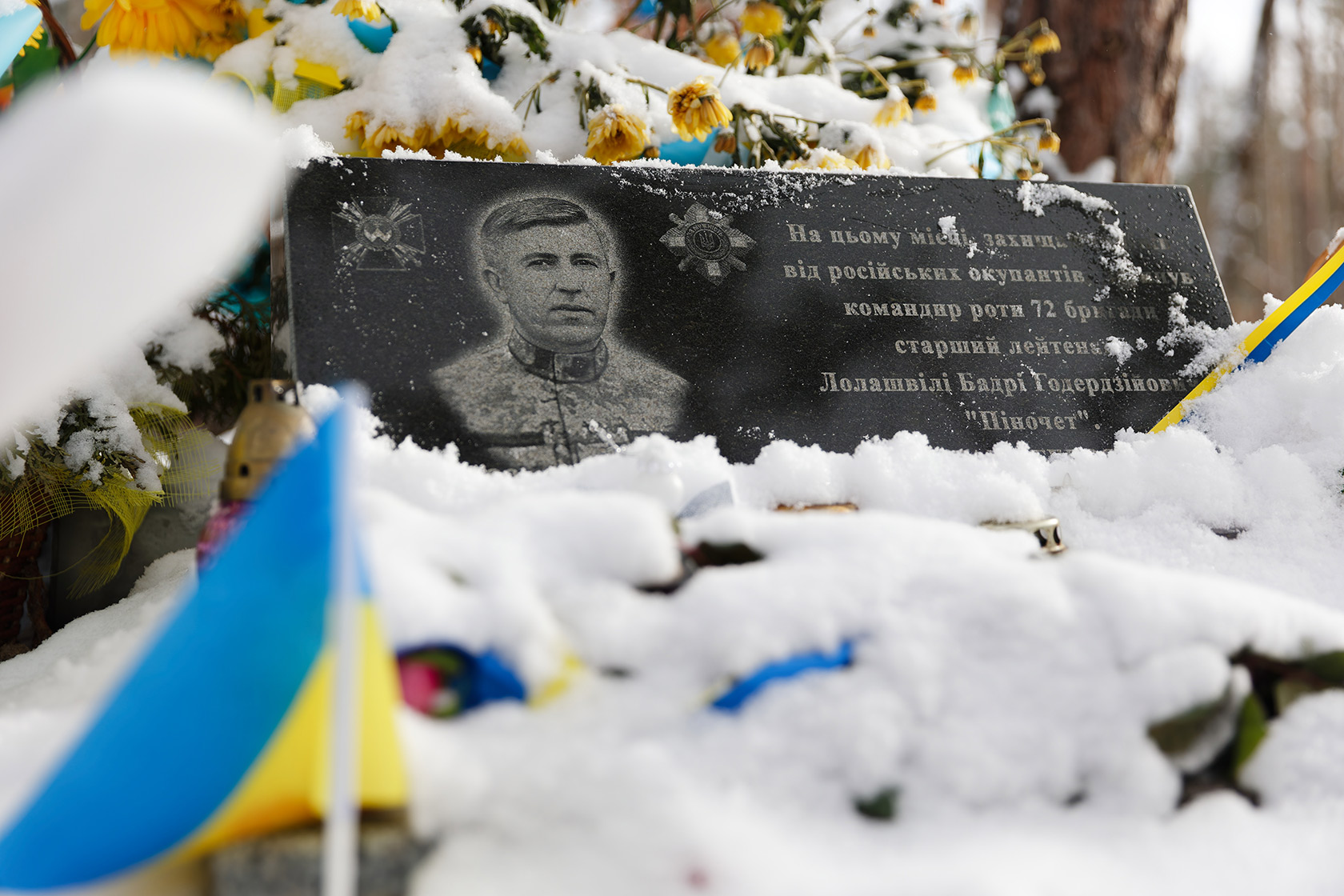 Before the full-scale invasion, Lolashvili headed the Kyiv City Educational Agency, which was engaged in the digitalisation of education in the capital
Before the full-scale invasion, Lolashvili headed the Kyiv City Educational Agency, which was engaged in the digitalisation of education in the capital
His body was found a month and a half after his death. In a trench filled with earth.
"Died of a gunshot wound during close combat," the medical examiner wrote in the report. The warrior was buried in Cherkasy Oblast on the day his son Damir turned one. When Damir grows up, two thoughts about this war are likely to evoke powerful emotions in him.
But for the Russians. Anger. But for my father, who died, but saved Kyiv.
Pride.
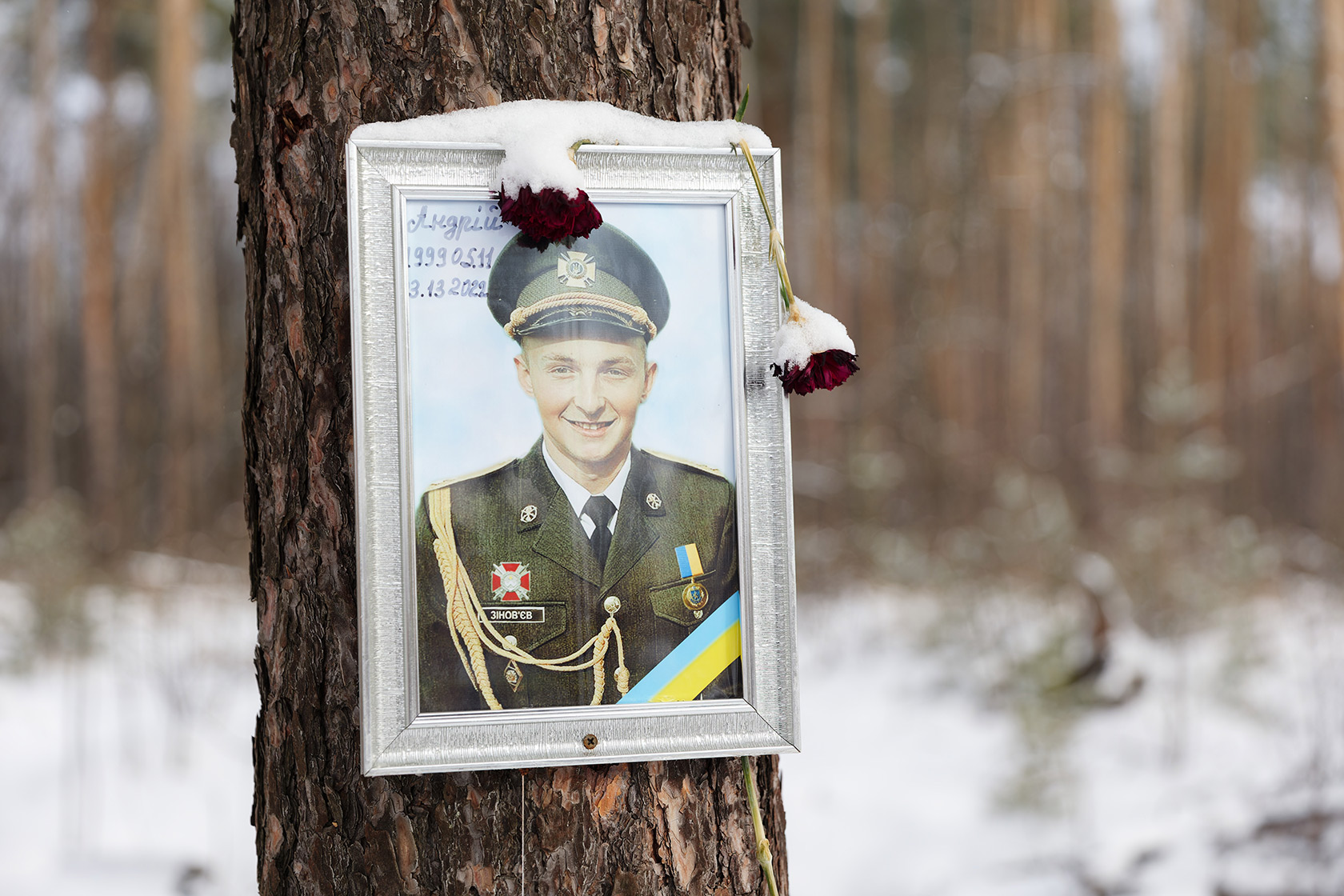 22-year-old Andrii Zinoviev was among those killed in the battles for Moshchun
22-year-old Andrii Zinoviev was among those killed in the battles for Moshchun
"I remember, last spring, as soon as the people returned, they bought seeds from me," says Serhii Markhonos, the shop owner. "Not just vegetables, they even planted flowers - you have to go on living. It will take a lot of work to rebuild everything. The main thing is to get help with resources, and we have plenty of hands.
We're not katsaps [a derogatory nickname for the Russians -ed.]! I had to visit Russia for work. Well, I was still able to spot some hard-working people in Kuban [a Russian province close to Ukraine's border].
But in the Urals... They can't even make moonshine, they drink home-brew." Since the March battles, the silence that Moshchun used to be famous for before the invasion has become even weightier, more profound.
"Now I have realised how important silence is," Serhii Markhonos's wife Valentyna says. "Now all I want is silence. You walk around, look up at the sun. It seems quiet.
But that's just here. What about over there, in other places? My soul is bleeding.
It's horrific. But victory will still be ours! They chose the wrong people to attack."
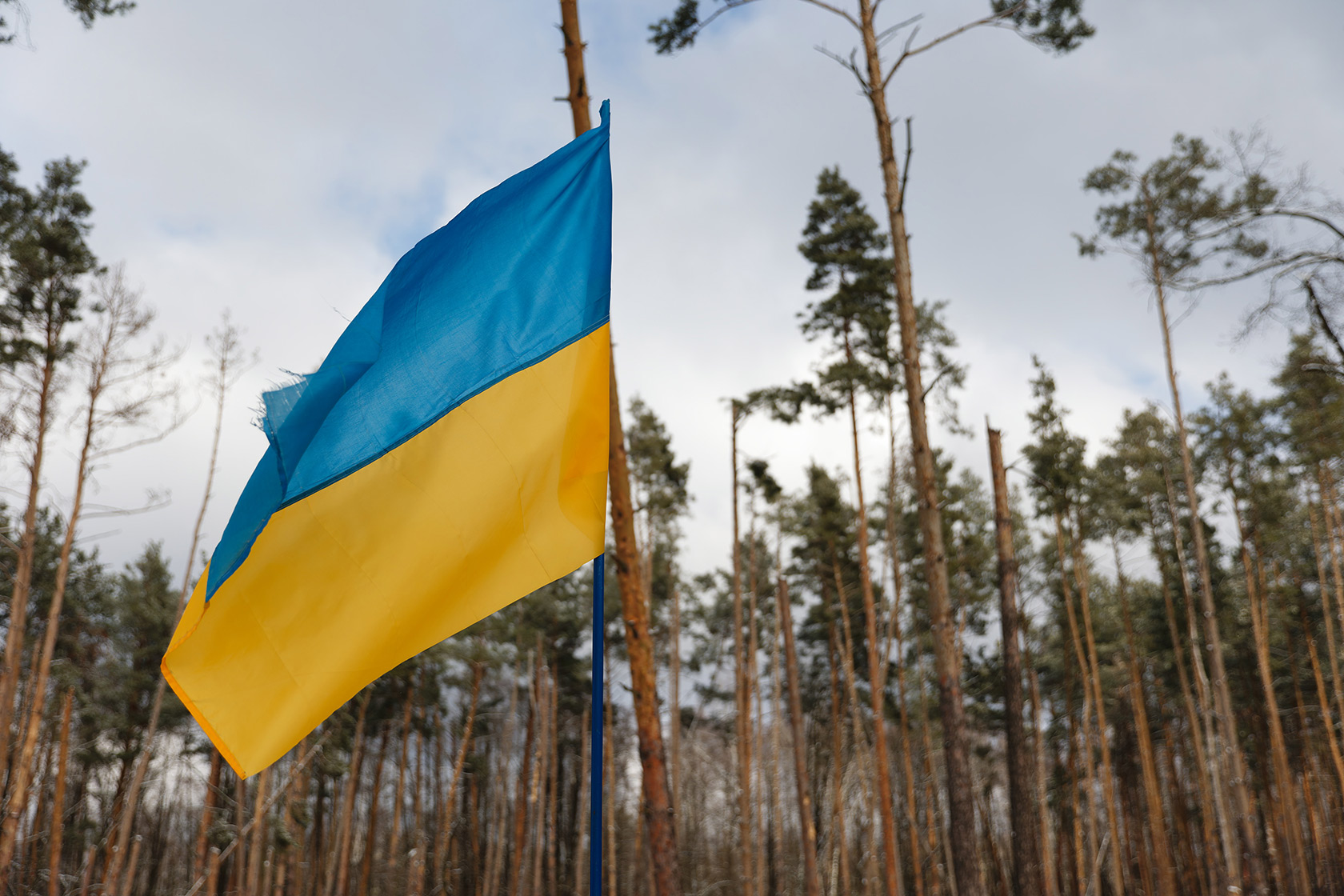 But for the Ukrainian defenders, the Russian flag would be flying in and around Kyiv
But for the Ukrainian defenders, the Russian flag would be flying in and around Kyiv
Translation: Oxana Hart
Editing: Teresa Pearce